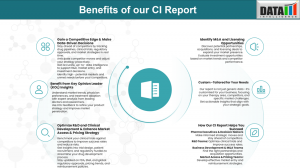Rewriting the Playbook in MPS I: CNS-Penetrant ERTs and Gene Therapies Usher in a New Treatment Era | CI Insights
Emerging CNS‑targeting ERTs and gene therapies for MPS I show promise for neurocognitive benefits, reduced treatment burden, and better outcomes.
Download CI Sample Report: https://www.datamintelligence.com/strategic-insights/sample/mucopolysaccharidosis-type-i-mps-i-treatment-revolution-the-role-of-innovative-gene-therapy-in-addressing-unmet-needs
MPS I Epidemiology in Context
- Incidence stands at about 1 in every 100,000 births, affecting boys and girls equally, and transcending race and ethnicity.
- Disease burden includes organ enlargement, skeletal deformities, respiratory challenges, and, in severe cases, neurocognitive decline.
- Early diagnosis, often triggered by symptom onset in infancy or early childhood, is critical for maximizing treatment success.
The Approved Standard of Care: Aldurazyme & Stem Cell Transplant
- Aldurazyme, the sole U.S. FDA-approved enzyme replacement therapy (ERT), replaces IDUA weekly via IV infusion. It alleviates somatic symptoms but does not cross the blood-brain barrier (BBB), leaving cognitive function unaddressed.
- Stem cell transplant (SCT) remains an option for infants with severe disease, with potential benefits to neurodevelopment, but it carries procedural risks and lifelong implications.
New Wave: Gene & Cell Therapies Targeting the Brain
The therapeutic landscape is expanding beyond symptomatic relief to target neurological decline:
- CNS-penetrant ERTs: These next-gen enzymes are engineered to cross the BBB, offering the potential to prevent or reverse neurocognitive damage. They also reduce infusion burden, with longer half-lives and possibly monthly or quarterly dosing.
- Gene therapies: Using viral vectors (e.g., AAV), these one-time IV treatments aim to restore IDUA production long-term. Strategies delivering genes to the liver or brain promise persistent enzyme expression and reduced need for chronic therapy.
Competitive Landscape: Treatment Dynamics Are Shifting
Aldurazyme continues to dominate, but newer therapies present meaningful differentiation:
- Neurological efficacy is no longer optional; emerging therapies claim both somatic and CNS impact.
- Convenience has shifted, with extended dosing intervals or single-dose approaches minimizing hospital visits.
- Patient‑centric design brings home administration and fewer infusion reactions.
- Economic value is critical—upfront costs for gene therapy may exceed traditional ERT, but lifetime cost-savings and improved outcomes argue for sustainable reimbursement.
Drivers of Market Disruption: Why the Shift Matters
- Unmet neurological need has long plagued MPS I care. New therapies can potentially protect brain function and improve developmental outcomes.
- Reduced burden through less frequent infusions or one-time therapy improves life quality and relieves caregivers.
- Health economics play a growing role—durable benefits may justify high cost if supported by clinical and real-world evidence.
Target Opportunity Profile (TOP): The Future Benchmark
New therapies must excel in the following areas to challenge Aldurazyme:
- Mechanism: Efficacy in both systemic and CNS compartments, ideally through gene therapy or BBB-penetrant ERT.
- Efficacy: Not just symptom control, but meaningful cognitive and functional gains.
- Safety: Low immunogenicity, minimal IV reactions, good long-term tolerability.
- Duration & convenience: From weekly infusions to monthly or even single-dose administration.
- Patient burden & pricing: Easier use, fewer hospital visits, cost-effectiveness supported by outcome gains.
Innovation: Leading-edge delivery platforms and CNS targeting technologies.
- Durability: Long-lasting effects, reducing or eliminating lifelong therapy.
- Stakeholder Implications
- Pharma developers need a sharp competitive edge—focusing on CNS-permeable technologies, early biomarker validation, and clear value communication with payers.
- Investors are watching as the field evolves; strong clinical data and regulatory clarity will unlock opportunities.
- Clinicians and families look forward to treatments that protect both body and brain—delivering hope where current ERT falls short.
Book Your Free CI Consultation Call: https://www.datamintelligence.com/strategic-insights/ci/mucopolysaccharidosis-type-i-mps-i-treatment-revolution-the-role-of-innovative-gene-therapy-in-addressing-unmet-needs
What Comes Next?
In the next 12–24 months, pivotal data is expected: early-phase CNS-penetrant ERT trials and initial gene therapy readouts. One-time gene treatments could file for approval by 2027, while translational data from ERTs may inform near-term regulatory submissions.
About Our Competitive Intelligence Report
Our new MPS I Competitive Intelligence Report offers:
- A granular analysis of pipeline programs with clinical milestones
- Scenarios modelling market uptake and patient outcomes
- Regulatory trends, pricing strategies, and reimbursement benchmarks
- Strategic insights tailored to drug development timelines and stakeholder positioning
Closing Perspective
We stand at a transformative moment in MPS I care. Where once the focus was limited to somatic symptom management, we now envision a world where neurodegeneration is preventable—and perhaps reversible. The next wave of therapies—CNS-targeting ERTs and gene therapy—appears poised to deliver just that, redefining not only how we treat MPS I, but what treatment can achieve.
Read Related CI Reports:
1. IGA Nephropathy Emerging Market Therapeutic Opportunities1
2. Transthyretin Amyloid Cardiomyopathy Genetic Disease Modifying Therapies2
Sai Kumar
DataM Intelligence 4market Research LLP
+1 877-441-4866
email us here
Visit us on social media:
LinkedIn
X
1 https://www.datamintelligence.com/strategic-insights/iga-nephropathy-emerging-market-therapeutic-opportunities
2 https://www.datamintelligence.com/strategic-insights/transthyretin-amyloid-cardiomyopathy-genetic-disease-modifying-therapies
3 https://www.datamintelligence.com/strategic-insights/mucopolysaccharidosis-type-i-mps-i-treatment-revolution-the-role-of-innovative-gene-therapy-in-addressing-unmet-needs

